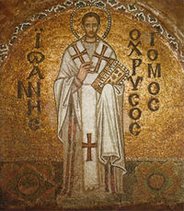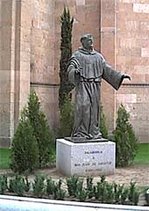A poem from Luis de Góngora, Quevedo's mortal enemy
Luis de Góngora y Argote (1561-1627)
Noble disappointment, I thank heavens
that you broke the rope that held me prisoner.
I’ll hang the heavy chains
of my grave errors1 in your temple
for such a great miracle!
Because with your help I shook
the strong joints of the silver yoke off my neck.
The damp candles and broken oars
that I rescued from the sea
and offered at port will now
be an ornament to your temple walls,
your name’s glory, and a disclaimer of love.
So, you’re overpowering the youthful archer.
Then may mad hopes, vain thoughts, lost steps,
trivial desires, angry cares, poisonous jealousy
and infernal glories pull your chariot
and be your prize.
Let them write you hymns, their verses saying
that you free captives and give sight to the blind.
May a thousand fires of the Sabeus tree’s
precious sap2 bow before your deity.
But who makes me delve into sensible matters
by speaking of the truth in these times
when people who dress in the latest fashion
spend most of their days in jokes and tomfoolery?
Ungrateful mistress of your own chambers,
lend me your ear for a time,
‘cause I want to give full reign to my rambling thoughts:
How many cold nights I was so frozen
that your dog mistook me for a street corner
and lifting his leg with grace,
he gilded my black shoes!
Oh, what nights like these, madam, I remember walking around looking for pebbles
on the ground to make a sign on your door
and upon picking one up my hands were beshat!
Oh, how many days I walked with great pains,
as if weighted down with steel,
because I was ill.
Being as skinny as I was
I looked like a cowbell,
bones on the inside and iron on the outside
How many months and years
I lived in agony on the Poor Hill without even being Beltenebros!3
Where I spent entire days writing sonnets,
eating nothing but my nails!
What foolish things I wrote on a thousand pages
that you laugh about now and I admit to.
Although there was at time
when I thought of them as discrete words
and you as come-ons.
How many midnights I sang on my instrument:
Madam, put out my fire!
when, although you did not respond,
the neighbor complied
by emptying a large bowl onto the street.
Goodbye, madam, because to me your face
is like a chimney in summer
and snow in winter-
you’ve filled my spleen with gall stones.
And I think being a dolt for six years is long enough!
1- in Spanish hierros- “chains”, yerros- “errors”
grave- “heavy” or “grave”
2- Poetic cliché from Virgil
3- Alternate identity of Amadís de Gaula, a knight-errant in medieval Spanish literature, who pretended to be a hermit after his lady insulted him.






















No comments:
Post a Comment